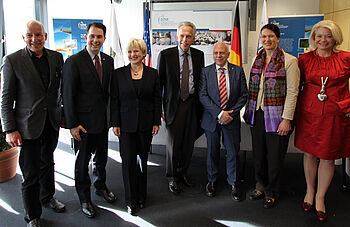The memorandum of understanding, signed today at a ceremony at the DZNE office in Bonn, provides a framework for future joint efforts aimed at slowing the onset of Alzheimer’s, Parkinson’s and other neurodegenerative diseases. The agreement is with the UW Institute for Clinical and Translational Research, housed within the School of Medicine and Public Health.
“The increasing prevalence of Alzheimer's disease is a looming public health crisis in the U.S., Europe and around the world,” said Dr. Richard Moss, Senior Associate Dean for Basic Research, Biotechnology and Graduate Studies at the UW School of Medicine, who signed the agreement on behalf of UW. “The new partnership between the UW School of Medicine and Public Health and DZNE, both of which are dedicated to improving the diagnosis and treatment of this disease, promises a significantly greater pace of discovery than would otherwise be possible.”
„The DZNE and the University of Wisconsin are conducting excellent translational research and cooperate with the best research institutions worldwide," said Prof. Pierluigi Nicotera, CEO of DZNE, who signed the agreement on behalf of the organization. “The agreement will lead to more innovation, new products for the care, diagnosis and therapy of patients with neurodegenerative diseases. The new contract is a further step to foster cooperation between two leading international research organizations in this field.
“Excellent research facilities attract outstanding scientists. The state of North Rhine-Westphalia is proud of its dense network of well-known research institutions, clusters of excellence and graduate schools in the field of Neuroscience. Among these you will find the research centers caesar and Jülich, the Universities of Cologne and Bonn and its university hospitals, only to name a few. The collaboration of DZNE and University of Wisconsin ICTR will enrich this network of researchers across at international level in the field of healthy aging”, said Dr. Beate Wieland, Director General for Research and Technology at State Ministry for Innovation, Science and Research in North Rhine-Westphalia, at the ceremony in Bonn.
“Both of these institutions have conducted groundbreaking research in this area. Through this collaboration, they hope to develop ways to not only slow down the pace of Alzheimer’s and other neurodegenerative diseases but also enable early diagnosis,” Governor Walker said. “Every 67 seconds someone in the U.S. develops Alzheimer’s, and we must use every means possible to fight this disease that not only kills, but also drastically reduces one’s quality of life.”
The agreement reached today calls for several specific areas of collaboration, including:
- Development of therapeutics designed to slow the onset of Alzheimer’s disease and dementia.
- Identification of new approaches to improving the care of patients with Alzheimer’s or other neurodegenerative diseases.
- Discovery of new drug targets for diseases such as Alzheimer’s disease or Parkinson’s disease.
- Dissemination and implementation of best practices for the diagnosis and care of patients with Alzheimer’s disease.
- Discovery of new biomarkers or other approaches to early diagnosis of neurodegenerative disease and ongoing assessment of disease progression.
The State of Wisconsin, through the Wisconsin Economic Development Corporation’s Capital Catalyst Seed Fund, and the Wisconsin Technology Innovation Initiative has established an initial $1 million seed fund to support commercialization of medical technology developed by the University of Wisconsin School of Medicine and Public Health.
The school’s Wisconsin Alzheimer’s Institute has developed the Wisconsin Registry for Alzheimer’s Prevention, which is the nation’s first and largest longitudinal Alzheimer’s-prevention research program. The program includes an internationally recognized study of middle-aged, adult children of Alzheimer’s patients, a study that has resulted in the world’s largest data set in Alzheimer’s research.
Since it was founded in 2009, the DZNE has grown to approx. 800 employees at nine sites across Germany. More than 70 research groups are investigating ageing processes, the similarities and differences of various neurodegenerative diseases. The DZNE utilizes an interdisciplinary approach that links scientific research, clinical investigations, health care research and population studies. The DZNE works closely with local university hospitals and other partners, including the Centers of Excellence in Neurodegeneration Initiative, the Dominantly Inherited Alzheimer Network and the Helmholtz-Alberta Initiative.
The memorandum of understanding was signed by Moss, Nicotera and Helling-Moegen at the DZNE office in Bonn. In addition to Governor Walker, attending the signing ceremony was Reed Hall, secretary & CEO of WEDC; Katy Sinnott, vice president of International Business Development for WEDC; Lisa Johnson, vice president of Entrepreneurship & Innovation for WEDC; Simone Stein-Lueke Mayor of Bonn-Bad-Godesberg; Beate Wieland, Director General – Research and Technology at State Ministry for Innovation, Science and Research of North Rhine-Westphalia; Martin Schumacher, Executive Director Division for Cultural Affairs, Sports and Science of the City of Bonn.

